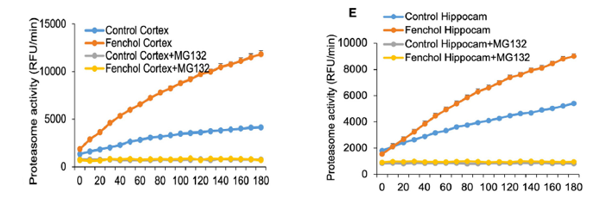Advantages
- Targeting neuroinflammation and proteostasis
- Strong preclinical efficacy in cells, C. elegans, and Alzheimer’s mouse models
- GRAS-designated natural compound with excellent safety profile
- Multiple delivery formats: oral, nasal, buccal, topical, supplement
Summary
Neurodegenerative diseases such as Alzheimer’s Disease (AD) are characterized by progressive neuronal loss, driven in part by amyloid-beta (Aβ) accumulation, impaired proteolytic clearance, and chronic inflammation. Recent research shows that the gut-brain axis and microbiota-derived metabolites are key players in neurodegenerative disease progression. One such metabolite-sensing pathway involves the Free Fatty Acid Receptor 2 (FFAR2), which is activated by short-chain fatty acids (SCFAs). Low SCFAs are associated with inflammation, proteolysis, and declining neuronal health.
Our researchers discovered that Fenchol, a natural compound found in basil and other plants, is a potent activator of FFAR2 signaling. This invention provides a novel therapeutic approach for treating neurodegenerative diseases with Fenchol. Fenchol functions by binding to FFAR2, mimicking endogenous SCFAs, to initiate downstream signaling. In vitro, fenchol treatment of human neuronal cell lines reduced amyloid-beta-induced cytotoxicity and restored cell viability. In vivo tests in transgenic C. elegans and APP/PS1 mouse models of AD, Fenchol reduced amyloid burden, improved behavioral outcomes, and enhanced proteasome activity in both the cortex and hippocampus.
Fenchol is generally recognized as safe and can be commercialized in multiple formats, including as an oral tablet, nasal spray, buccal tablet, topical cream, or dietary supplement.

Fenchol (commonly present in basil plant/leaves) increases protein clearance in memory centers in AD mouse model.
Desired Partnerships
- License
- Sponsored Research
- Co-Development